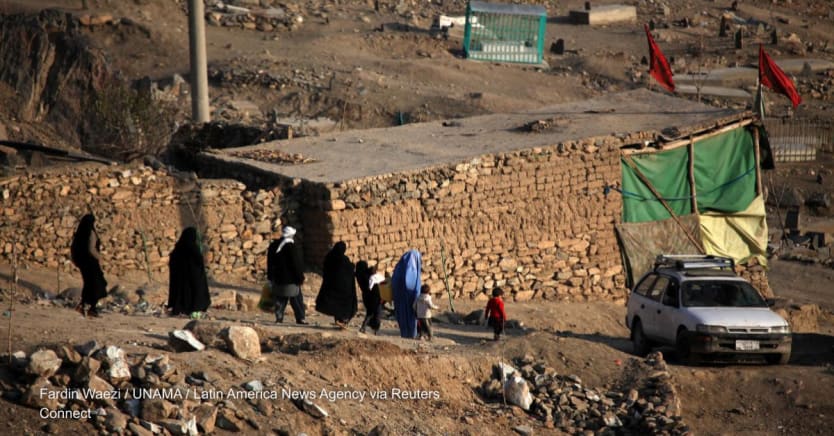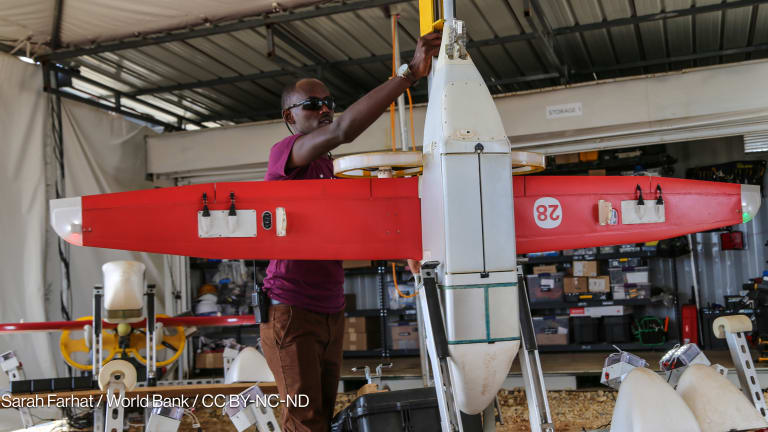
Divisions are emerging on the European Union’s aid strategy in Afghanistan, as the humanitarian and development departments tussle over when and how to help the population of 40 million people.
The two directorates have vastly different global budgets through 2027 — €11.5 billion ($13 billion) for the humanitarian arm European Civil Protection and Humanitarian Aid Operations, or ECHO, compared to around €74 billion for development at the newly renamed department for International Partnerships, or INTPA. The latter had set aside around €1 billion for Afghanistan for the next seven years, but it froze all development support through the government when the Taliban swept to power in August.
“The one thing we do have [in Afghanistan] is development funding — and I'm not sure we are showing the urgency around this that we should.”
— Barry Andrews, an Irish liberal member of the European ParliamentIn October, the EU announced around €1 billion support package to the country, including €300 million for humanitarian needs through ECHO, and €250 million for “humanitarian plus” work overseen by INTPA, including paying the salaries of teachers and nurses via the United Nations. The rest will be allocated by INTPA at a later date, keeping some funding in reserve for reconstruction and other needs.
“We also want to keep this around €400 million to €500 million in our pockets and also follow the [developments] and then decide how to allocate the rest of the funding,” Jutta Urpilainen, the EU commissioner responsible for development policy, told the European Parliament earlier this month. She added that this could either go to Afghanistan or to neighboring countries to deal with migration, terrorism, organized crime, and human trafficking.
That prompted Niamh nic Carthaigh, director of EU policy and advocacy at the International Rescue Committee, to warn against “any diversion of humanitarian funds to bolster neighbouring states’ border capacity or to prevent onward migration from the region,” she wrote in an email to Devex.
With an estimated 22.8 million people facing crisis levels of food insecurity in the coming months, some argue that now is not the time to hold back resources. “We urge the EU and other major donors to take all steps necessary to unlock all available funding and urgently facilitate the flow of aid to where it’s most needed on the ground,” Smriti Singh, deputy South Asia director at Amnesty International, told Devex by email Thursday.
Janez Lenarčič, the humanitarian aid commissioner, told Devex last Friday that questions over why money remained under INTPA’s control, rather than being transferred to ECHO for quick disbursement, should not be addressed to him.
“We [ECHO] do what we can with the funds that we have,” he said. “And the funds that we have are the funds that are budgeted plus any transfer that we receive.”
At the same time, Lenarčič acknowledged, “we can take all the money that anybody is willing to give us and it will still not be enough given the needs.”
Lenarčič was absent from Urpilainen’s appearance at the Parliament’s development committee this month, where she portrayed humanitarian-plus as “a narrow corridor or path of intervention that goes beyond purely life-saving humanitarian aid but does not mean regular development support.”
“In practice, we will be implementing the humanitarian-development nexus,” she told members of the European Parliament, adding that humanitarian-plus spending, which will be overseen by her department, would focus on areas such as health, education, and nutrition.
However, working with international organizations to implement this novel approach will likely take months, not the weeks ECHO says it would need to roll out any extra resources it received. Asked about that discrepancy last Friday, Lenarčič answered simply: “Yes, you’re right.”
The daylight between the positions of the two commissioners is being noticed. “I want to know from Lenarčič where he sits on this [humanitarian-plus],” Barry Andrews, an Irish liberal member of the European Parliament, told Devex in his office recently. “I want to see the two of them making joint statements about this. I want to identify that Lenarčič is comfortable with this initiative. And I want them to use it symbolically to sell the nexus idea.”
Andrews, a former minister of state for children and head of the Irish charity GOAL, said the EU’s aid architecture — with the greater-resourced INTPA unable to support hostile governments in the likes of Ethiopia and Afghanistan, and the cash-strapped though purely humanitarian ECHO — left Brussels with few options in times of crisis.
“The one thing we do have [in Afghanistan] is development funding — and I'm not sure we are showing the urgency around this that we should,” Andrews said, dismissing the “tiny” €9.53 billion cushion designed to respond to unforeseen crises between now and 2027, “What is needed is further funding from the development pot in Afghanistan very urgently.”
As for humanitarian-plus, Andrews said it should be scrutinized by the European Parliament as though it were a new instrument. “What we have instead is the occasional presence of the commissioner … releasing information in one-and-a-half pages,” he said. “It's just not good enough … I’m not even sure what the modalities are. There’s nothing written down, we're getting it live and in person. In fairness, most of the development committee members find it very hard to follow what's going on.”
Search for articles
Most Read
- 1
- 2
- 3
- 4
- 5








